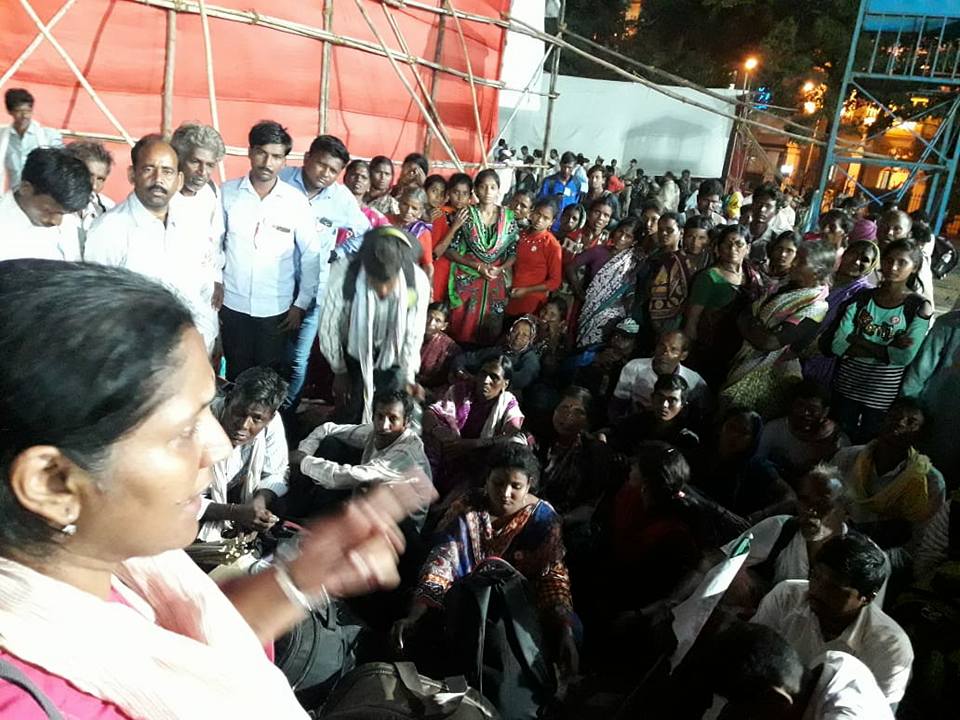The forest land issue has become serious because of the Maharashtra government’s project of planting 50 crore trees of which 15 crores were planted last year and 33 crores were planted this year. The forest department issued notices to farmers in several villages asking them stop agriculture as they required the land for tree plantation. This created panic across the State including in our work area. We organised the farmers and started a campaign titled ‘Van Hakka Shetkari Abhiyan’ (Forest Rights for Farmers Campaign). The first work of the campaign was to answer every notice that the forest department issued and stop evictions. Thus, we answered notices in villages including Murti, Lakkadkot, Sarandi, Janala, Ramkrushnapur, Gitali, Hari Nagar etc. We were able to stop evictions in all villages of Chandrapur district.
In Gadchiroli district the forest department specifically targeted the villages of resettled Bengali refugees, and issued notices in Hari Nagar, Sundar Nagar, Khudirampally, Ramkrushnapur, Gitali etc. Here the forest department was adamant because they knew that the Bengali community is most vulnerable. As reported previously, the Bengali community is unable to access forest rights because they were rehabilitated between 1964-1967 and were given citizenship in the 1970s. The forest department knows that this community has no chances of getting pattas under FRA and therefore they can be easily targeted. The Bengali community took out a rally in Gadchiroli on this issue. After a joint meeting with the District Collector, Gadchiroli, the forest department was directed that they should not evict anybody till the claims are finally settled. However, by this time the forest department had already evicted three farmers and arrested two people of the same family at Ramkrushnapur.
The organisation helped Bengali farmers to file a representative writ petition in Nagpur High Court arguing that the provisions of Section 2 (o) of the FRA should not be applied on them, but the court dismissed their petition, with the observation that the court would not interfere in the legislation. Thereafter the organisation met with Mr. Jairam Ramesh, M.P Rajya Sabha regarding forest rights of Bengali refugees as well as other non-tribal forest land cultivators.
The Van Hakka Shetkari Abhiyan first contacted and had intense discussions with key persons in different areas – those who are themselves forest land cultivators and also community leaders. Through these meetings the organisation got in depth understanding of the problems being faced by the different communities, in different villages and also some common issues being faced by all. All these key persons were invited to the first meeting of the Van Hakka Shetkari Abhiyan held at the organisation’s office at Chitegaon. Out of those present two or three representatives were elected from each block as representatives of the Central Committee of the Abhiyan. There are 35 members of the Central Committee from Chandrapur and Gadchiroli districts. The Central Committee organised a detail press conference to announce the Abhiyan publicly and also to inform the press about the issues. Three common issues were selected by the Abhiyan:
The provision in the FRA i.e. 2 (o) which requires residence proof of 1930 from non-tribal forest land cultivators should be repealed.
Although pattas are being issued by the administration, the revenue records are not being updated and therefore the legal status of the land is not changed on the records. The Forest Department continues to appear as the owner of the land. The names of the patta-holders appear in the ‘Other Rights’ column as subsidiary holders. Thus, the patta is a useless piece of paper which cannot be used to get bank loans or access government schemes. Therefore the second demand of the Campaign is that the revenue records should be updated and independent titles should be issued to every patta-holder.

